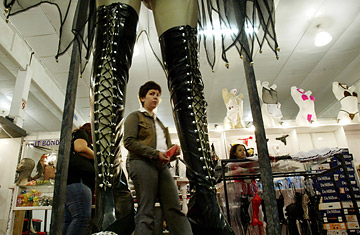
A woman visits a store at the 8th Erotika Fair in Sao Paulo, Brazil.
The windfall from Brazil's stellar economic performance is trickling down to some unexpected places. Trade fairs at Sao Paulo's Mart Center usually feature kitchen equipment, textiles, and new trends in the security business, but the curvaceous girls in bikinis and high heels and muscled go-go boys in tight shorts are here selling something more adventurous — massage oils, furry handcuffs and 10-inch silicon vibrators. Welcome to Brazil's 12th annual Erotikfair, where business is booming.
The country's sex toy industry had grown at a steady 10% to 15% a year since the late 1990s, but the market has spiked in recent years as Brazil's economy takes off. The cost of imported dildos, lingerie and related paraphernalia had previously reserved them for a moneyed elite. But the recent economic upturn has spread some of the wealth to the working and lower-middle classes through government assistance programs and wage increases. Credit is more accessible than ever before, interest rates having more than halved, giving more people more disposable income to spend on cars, furniture, travel, electronics, domestic appliances, and 10" silicon vibrators. (See pictures of the global financial crisis.)
The boom is good news for Edvaldo Bertipaglia, CEO of Hot Flowers, one of Brazil's biggest makers and distributors of what he calls "sensual products," who says his business has outstripped even the wider industry's growth, doubling in size every year since 2004. Bertipaglia has quintupled his workforce and added three factories to his original one a few miles from Sao Paulo. The Hot Flowers catalogue now boasts around 300 products, where it had offered just 12 in 2004. "Our problem today is keeping up with growth," Bertipaglia said at the fair, as clients who own or want to start sex shops lined up to meet him and discuss deals. (See pictures of Sao Paulo: The "Clean City".)
The erotica entrepreneur attributes the growth in his market to the fact that as many as 20 million people have in recent years joined Brazil's middle class — defined in Brazil as Class C, or households whose monthly income is around $581. (The highest earners, Class A, take home on average $4,300 a month; the lowest, Class E, pocket an average of $167.)
"Today 70% of my clients are in Class C," Bertipaglia said. "Four years ago I think people in Class C didn't even make up 20% of my clientele. People in Class C today have more buying power. People are better off."
A second reason for the erotica boom is the empowerment of Brazilian women, says Evaldo Shiroma, president of the industry trade association and organizer of Erotikfair. With more money comes more independence, and Brazilian women — never known as shrinking violets — are taking their needs into the erotica marketplace. "Women are buying products, and so demand has really gone up," Shiroma said. "Back in 1997, less than 5% of consumers were females, today that number is about 70% or 80%. That is the key reason for the explosion in interest."
While women may represent the lion's share of retail shoppers, the buyers at Erotikfair are overwhelmingly male. Thousands of young men wander the halls, snapping photos of themselves with scantily clad strippers and patiently waiting in line to enter the Tunnel of Sensations, a darkened labyrinth where naked women — some wrapped in body-sized condoms — hug and kiss the tactile men passing through.
Some couples browse and attend talks on sexuality and relationships, while groups of women enjoy the male belly dancers shaking their wares in between plaster busts of the Pharaoh. Others do some shopping. Still, most of the visitors seem more interested in titillation, with many simply drinking beer and ogling the strippers and porn stars who happily stand around in their underwear.
"It's not a cultural change, it's an economic change," says Ralmer Rigoletto, the psychologist who is president of the Centre for Research and Studies into Sexuality and Behaviour. "The economy is better and so people have access to products that they didn't have access to before. And that includes erotic products."
